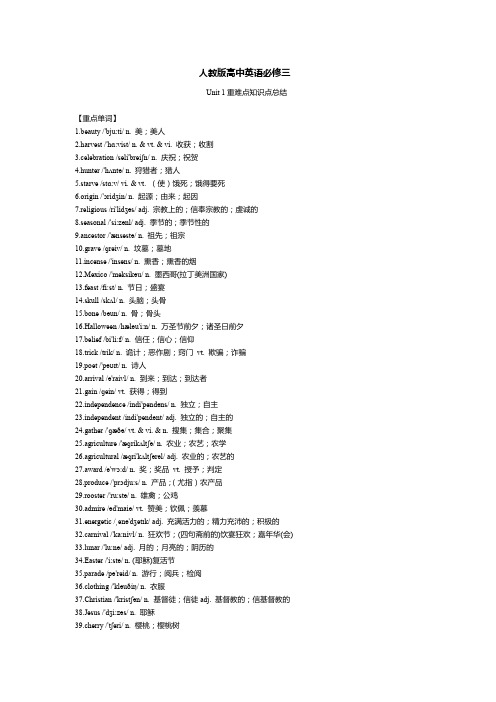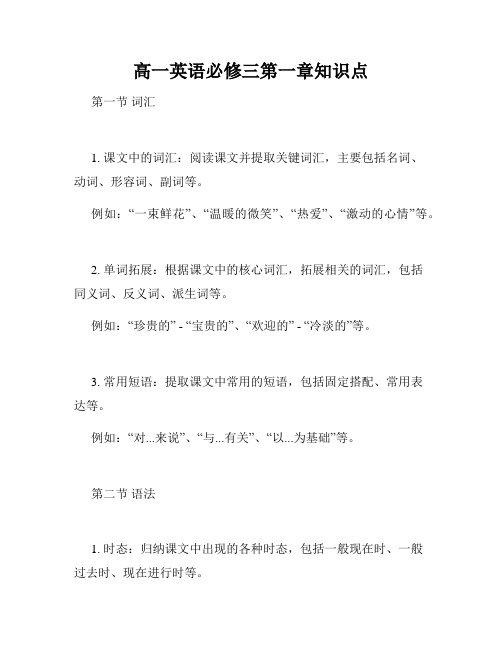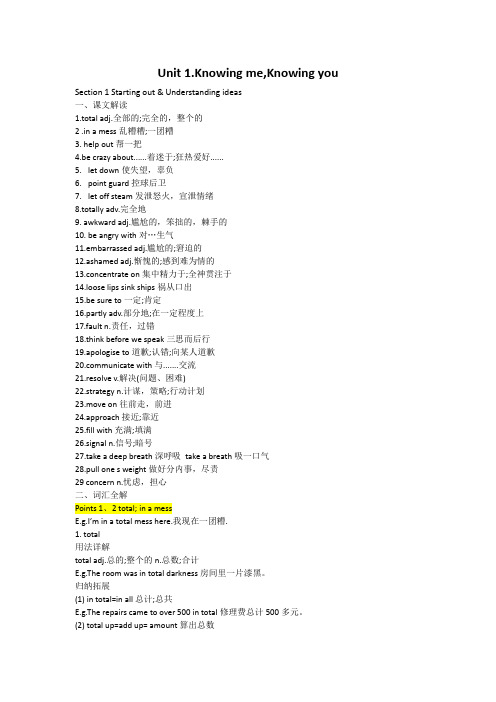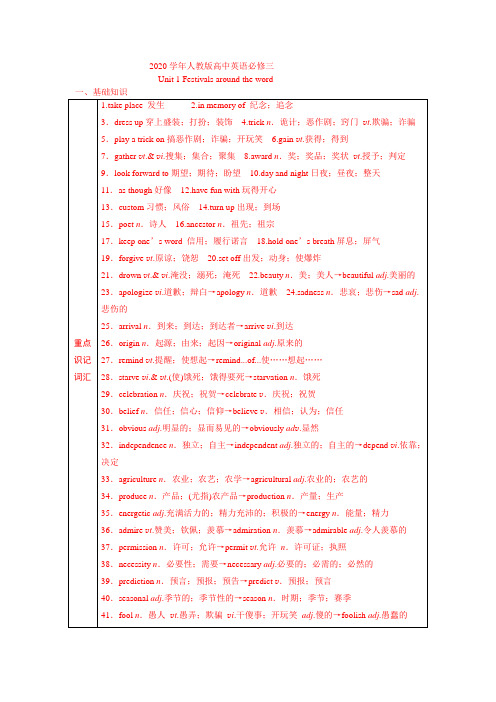高中英语必修三第一单元知识点总结教学提纲
人教版高二必修三英语第一单元知识点总结

1. mean to do sth.打算做某事 mean (doing) sth 意味着做某事 be meant for打算给予……,打算做……⽤ (had) meant to do 本来打算做⽽实际上未做 by all means 可以,当然⾏,没问题 by means of 借助……的⼿段;依靠……⽅法 By no meant绝不,⼀点⼉也不2. take place发⽣3. do harm/good有害处/好处4. go to clean graves扫墓5. in memory of 为了纪念…… in celebration of为了庆祝…… in favor of赞同…… in praise of为了表扬……6. in the shape of 以……的形状7. offer sb sth=offer sth to sb提供某⼈某物/某物给某⼈ offer to do sth主动提出做某事/建议将做某事 offer (sb) money for sth(向某⼈)出价多少买某物 offer (sb) sth for money(向某⼈)开价多少卖某物8. dress up装扮9. play a trick/tricks on=play a joke/jokes on开玩笑 10. the arrival of……的回归 11. gain independence获得独⽴ 12. the agricultural work农活 13. decorate… with⽤……装饰…… 14. win awards赢得奖品 15. admire the moon赏⽉ admire sb for sth因为……羡慕某⼈ 16. look forward to doing sth期待做某事17. day and night⽇⽇夜夜 18. colourful clothing of all kinds各种各样的漂亮的⾐服 19. as though/if好像 20. be covered with 被……覆盖 21. have fun with取乐 22. a worldwide holiday全世界的节⽇ 23. turn up/away/back/down/in/off/on/out/over/to出现/拒绝/原路返回/关⼩,拒绝/上交/转变;关掉/打开/证明是;⽣产/翻转/转向;求助于 in turn轮流/反过来 take turns to do sth/in doing sth轮流做某事 do sth by turns轮流⼲某事 24. laugh at 嘲笑 make fun of取笑 25. keep one’s word/promise守信⽤,履⾏诺⾔26. hold one’s breath屏住呼吸 27. It is obvious that很明显…… 28. wipe the table擦桌⼦ 29. fall in love with sb爱上某⼈ be in love相爱(与表⽰⼀段时间的动词连⽤) get married/be married to sb/ marry sb与某⼈结婚 30. once a year⼀年⼀次 31. set off出发 set about着⼿开始 set…against把……与……⽐较/对⽐ set back 使……后退,阻碍,拨慢(钟表) set forward前进,促进,拨快(钟表) set down 写下 set out动⾝,出发;摊开,陈列;表述(理由) 32. throw…away扔掉 33. remind…of 使……想起……remind sb to do sth提醒某⼈⼲某事 34. forgive sb原谅某⼈ 35. a kind of +n.(s./pl.)+V(单)⼀种 kinds of +n.(s./pl)+V(复)各种各样的 36. hold back阻⽌,退缩 hold on to 抓住,不卖掉,不放弃 hold on 等⼀等,请稍等,坚持,忍受着 hold up 举起,拿起,延误,使停顿 hold out伸出 37. starve for渴望,缺乏 starve to death饿死 38. important religious festival重要的宗教性节⽇ 39. light lamps点灯 40. apologize to sb for (doing) sth因某事向某⼈道歉 =say sorry to sb for sth =make/offer an apologize to sb for (doing) sth apologize to sb for sb替某⼈向某⼈道歉。
人教版高中英语必修三Unit 1 重难点知识点总结

人教版高中英语必修三Unit 1重难点知识点总结【重点单词】1.beauty /'bju:ti/ n. 美;美人2.harvest /'hɑ:vist/ n. & vt. & vi. 收获;收割3.celebration /seli'breiʃn/ n. 庆祝;祝贺4.hunter /'hʌntə/ n. 狩猎者;猎人5.starve /stɑ:v/ vi. & vt. (使)饿死;饿得要死6.origin /'ɔridʒin/ n. 起源;由来;起因7.religious /ri'lidʒəs/ adj. 宗教上的;信奉宗教的;虔诚的8.seasonal /'si:zənl/ adj. 季节的;季节性的9.ancestor /'ænsestə/ n. 祖先;祖宗10.grave /ɡreiv/ n. 坟墓;墓地11.incense /'insens/ n. 熏香;熏香的烟12.Mexico /'meksikəu/ n. 墨西哥(拉丁美洲国家)13.feast /fi:st/ n. 节日;盛宴14.skull /skʌl/ n. 头脑;头骨15.bone /bəun/ n. 骨;骨头16.Halloween /hæləu'i:n/ n. 万圣节前夕;诸圣日前夕17.belief /bi'li:f/ n. 信任;信心;信仰18.trick /trik/ n. 诡计;恶作剧;窍门vt. 欺骗;诈骗19.poet /'pəʊɪt/ n. 诗人20.arrival /ə'raivl/ n. 到来;到达;到达者21.gain /ɡein/ vt. 获得;得到22.independence /indi'pendəns/ n. 独立;自主23.independent /indi'pendənt/ adj. 独立的;自主的24.gather /'ɡæðə/ vt. & vi. & n. 搜集;集合;聚集25.agriculture /'æɡrikʌltʃə/ n. 农业;农艺;农学26.agricultural /æɡri'kʌltʃərəl/ adj. 农业的;农艺的27.award /ə'wɔ:d/ n. 奖;奖品vt. 授予;判定28.produce /'prɔdju:s/ n. 产品;(尤指)农产品29.rooster /'ru:stə/ n. 雄禽;公鸡30.admire /əd'maiə/ vt. 赞美;钦佩;羡慕31.energetic /ˌenə'dʒetɪk/ adj. 充满活力的;精力充沛的;积极的32.carnival /'ka:nivl/ n. 狂欢节;(四句斋前的)饮宴狂欢;嘉年华(会)33.lunar /'lu:nə/ adj. 月的;月亮的;阴历的34.Easter /'i:stə/ n. (耶稣)复活节35.parade /pə'reid/ n. 游行;阅兵;检阅36.clothing /'kləuðiŋ/ n. 衣服37.Christian /'kristʃən/ n. 基督徒;信徒adj. 基督教的;信基督教的38.Jesus /'dʒi:zəs/ n. 耶稣39.cherry /'tʃeri/ n. 樱桃;樱桃树40.blossom /'blɔsəm/ n. 花vi. 开花41.custom /'kʌstəm/ n. 习惯;风俗42.worldwide /'wə:ldwaid/ adj. 遍及全世界的;世界性的43.rosebud /'rəuzbʌd/ n. 玫瑰花蕾44.fool /fu:l/ n. 愚人;白痴;受骗者adj. 傻的vt. 愚弄;欺骗vi. 干傻事;开玩笑45.necessity /ni'sesəti/ n. 必要性;需要46.permission /pə'miʃn/ n. 许可;允许47.prediction /pri'dikʃn/ n. 预言;预报;预告48.fashion /'fæʃn/ n. 样子;方式;时尚49.parking /'pɑ:kiŋ/ n. (汽车等)停放50.apologize /ə'pɔlədʒaiz/ vi. 道歉;辩白51.drown /draun/ vt. & vi. 淹没;溺死;淹死52.sadness /'sædnis/ n. 悲哀;悲伤53.obvious /'ɔbviəs/ adj. 明显的;显而易见的54.wipe /waip/ vt. 擦;揩;擦去55.weave /wi:v/ vt. & vi. (wove/wəuv/,woven/'wəuvn/) 编织;(使)迂回前进56.herd /hə:d/ n. 牧群;兽群57.magpie /'mæɡpai/ n. 喜鹊58.weep /wi:p/ vi. (wept, wept) 哭泣;流泪n. 哭;哭泣59.announcer /ə'naunsə/ n. 广播员;告知者;报幕员60.remind /ri'maind/ vt. 提醒;使想起61.forgive /fə'ɡiv/ vt. (forgave /fə'ɡeiv/, forgiven /fə'ɡivn/ )原谅;饶恕【重点短语】1.mean doing sth. 意味着做某事2.mean to do sth. 打算或企图做某事3.be meant for 打算作……用4.take place 发生;举行5.of all kinds 各种各样的6.starve to death饿死7.be starved of 缺乏8.starve for ... / starve to do... 渴望……9.plenty of 大量; 充足10.be satisfied with对……感到满意11.to one’s satisfaction感到满意是12.in the shape of呈……的形状;以……形式13.in memory of sb./ to the memory of sb. 纪念某人14.dress up 穿衣服;打扮;化装15.award sth.(to sb.) 授予(某人)某物16.award sb. sth.(for ...) (因……)授予某人某物17.reward sb. for... 因……奖赏某人18.reward sb. with sth. 用某物酬劳某人19.admire sb. for... 因……钦佩某人20.look forward to期望,期待,盼望21.turn up 出现;把(收音机等)音量开大些22.turn down 拒绝;把(收音机等)音量开小些23.turn off 关掉24.turn on 打开25.turn out 结果是……26.turn to sb. for help 向某人求助27.keep one’s word 守信28.break one’s word 失信【重点句型】1.Please make sure when and where the accident took place.请查清楚事故是何时何地发生的。
高一英语必修三第一章知识点

高一英语必修三第一章知识点第一节词汇1. 课文中的词汇:阅读课文并提取关键词汇,主要包括名词、动词、形容词、副词等。
例如:“一束鲜花”、“温暖的微笑”、“热爱”、“激动的心情”等。
2. 单词拓展:根据课文中的核心词汇,拓展相关的词汇,包括同义词、反义词、派生词等。
例如:“珍贵的” - “宝贵的”、“欢迎的” - “冷淡的”等。
3. 常用短语:提取课文中常用的短语,包括固定搭配、常用表达等。
例如:“对...来说”、“与...有关”、“以...为基础”等。
第二节语法1. 时态:归纳课文中出现的各种时态,包括一般现在时、一般过去时、现在进行时等。
例如:“I usually go to school by bus.”、“She wrote a letter to her friend yesterday.”等。
2. 语态:总结课文中的被动语态句型,理解主动语态和被动语态的转换规则。
例如:“The book was written by an American author.”、“Many trees have been planted in the park.”等。
3. 从句:分析课文中的主从复合句结构,包括定语从句、宾语从句、状语从句等。
例如:“The film that we watched last night was very interesting.”、“I believe that she will succeed.”等。
第三节阅读理解1. 主旨大意:归纳课文的主旨和总体内容,抓住文章的中心思想。
例如:“本课文主要讲述了环保和可持续发展的重要性,并鼓励大家参与其中。
”2. 细节信息:找出课文中的关键信息,包括人名、地名、时间、数字等。
例如:“The Green Earth Club was founded by a group of enthusiastic students in 2008.”3. 推理判断:根据课文的线索进行推理判断,分析作者的观点和意图。
高中英语必修三 unit 1 知识点

III---1 Festivals around the world一、知识点1.Festivals are meant to celebrate important times of year. 节日是用来庆祝一年的重要时光的。
mean doing sth. 意味着mean to do sth. 打算或企图做某事mean sb. to do sth. 打算让某人做某事be meant for 打算作……用;为…而有I believe he is meant to be a soldier.我相信他天生是要当军人的。
2. Discuss when they take place and what people do at that time. take place发生,举行take the place of代替,替代3. the beauty of the full moon 满月的美4. watch the full moon with family and friends和家人、朋友一起看满月5. Some festivals are held to honour the dead or to satisfy the ancestors, who might return either to help or to do harm. 有些节日,是为了纪念死者,或使祖先得到满足,因为祖先们有可能回到世上给人们提供帮助,也有可能带来危害。
to return to London 回到伦敦Return the book to the library. 把书归还给图书馆。
On my return from work, I saw the door was open. 我下班回家时,看见门开着。
6. …go to clean graves and light incense in memory of their ancestors…….去上坟、扫墓、烧香,以缅怀祖先。
人教高中英语必修三Unit1课本知识点复习

⼈教⾼中英语必修三Unit1课本知识点复习必修三Unit 1课本知识点复习⼀. 词汇变形1. mean v./adj. 打算;意味着;吝啬的-- meaning n. 含义-- means(单复数同形)n.⽅式2. celebrate v. 庆祝-- celebration n. 庆祝3. starve v.挨饿-- starvation n. 挨饿,饥饿4. origin n. 起源;起因-- original adj. 原来的,起初的-- originally adv. 原来;起初5. honour v./n. 尊敬,尊重-- honourable adj. 可敬的,品格⾼尚的6. satisfy v. 满⾜-- satisfied adj. 感到满意的-- satisfying adj. 令⼈满意的-- satisfaction n. 满意7. belief n. 信⼼;信念-- believe v. 相信8. arrive v. 到达-- arrival n. 达到9. independence n. 独⽴,⾃主-- independent adj. 独⽴⾃主的-- dependent adj. 依赖的10. admire v.赞美;钦佩;羡慕-- admirable adj.令⼈羡慕的-- admiration n.钦佩;赞赏11. energy n. 能量-- energetic adj. 充满活⼒的12. fool n./v 愚⼈;愚弄-- foolish adj.愚蠢的-- foolishly adv. 愚蠢地-- foolishness n. 愚蠢13. permit v./n. 允许,许可;许可证-- permission n. 允许14. please v. 使愉快-- pleasing adj. 令⼈⾼兴的-- pleased adj. 感到⾼兴的--pleasant adj. 令⼈愉快的-- pleasure n. 愉快15. apologize v. 道歉-- apology n. 道歉16. remind v.提醒-- reminder n. 提⽰信;通知单17. forgive v. 原谅-- forgivable adj. 可原谅的-- forgiveness n. 原谅,宽恕18. religion n. 宗教-- religious adj. 宗教的⼆. 短语积累1.(1)mean vt. 有....的⽬的,打算。
新外研版高中英语必修三Unit 1 知识点总结

(1)请随便夹你喜欢的东西吃。
Pleasewhat you like to eat.
(2)当她看到这个奇怪又有趣的人时,她禁不住笑了。
When she saw the strange and funny person, shelaughing.
Point4be crazy about
E.g I’mcrazy about basketball我对篮球很着迷…..
(3)with the help of.在…的帮助下
练习:
1.单句改错
She saw anadvertisementforvolunteers at her local gym and as she is interested in the whole area of dietand exercise she though she would help for.
13.concentrate on集中精力于;全神贯注于
14.loose lips sink ships祸从口出
15.be sure to一定;肯定
16.partly adv.部分地;在一定程度上
17.fault n.责任,过错
18.think before we speak三思而后行
19.apologise to道歉;认错;向某人道歉
Point3help out
E.g.......hope you can help me out!………希望你能帮我一把!
【用法详解】help out帮一把;帮助…解决困难/渡过难关
I willhelp out on my father's farm this summer.
今年夏天我要到父亲的农场去帮忙。
高一英语必修三module1知识点总结

高一英语必修三module1知识点总结高一英语必修三Module 1知识点总结Module 1 of the high school English curriculum for Grade 10 covers a variety of essential knowledge points. In this article, we will summarize the key points covered in Module 1, providing a comprehensive overview for students.1. Vocabulary:- Build a strong foundation in vocabulary by learning and memorizing words related to various topics, such as technology, culture, and social issues.- Work on expanding your word bank through reading books, articles, and engaging in conversations.- Practice using new vocabulary in different contexts to enhance your understanding and usage.2. Reading Skills:- Learn effective reading strategies, including skimming and scanning, to quickly comprehend the main points of a text.- Develop the ability to infer meanings through context clues, making it easier to understand unfamiliar words or phrases.- Understand different text types and their structures, such as narrative, descriptive, and argumentative texts.3. Listening Skills:- Enhance your listening skills by regularly practicing with authentic materials, such as movies, podcasts, and recordings of native English speakers.- Focus on understanding the main ideas, supporting details, and the speaker's tone and attitude.- Take notes while listening to strengthen your ability to absorb information and remember important details.4. Speaking Skills:- Improve your ability to express yourself clearly and confidently through regular speaking practice.- Engage in conversations with classmates or English-speaking friends to develop fluency and accuracy.- Pay attention to pronunciation, stress, and intonation patterns to sound more natural.5. Writing Skills:- Master the basic elements of writing, including grammar, sentence structure, and paragraph development.- Learn different types of writing, such as essays, letters, and reports, and understand the specific requirements for each.- Revise and edit your writing to improve coherence, cohesion, and overall clarity.6. Grammar:- Gain a solid understanding of essential grammar rules, such as tenses, articles, prepositions, and conjunctions.- Practice using grammar in context to reinforce your knowledge and accuracy.- Review common grammatical mistakes and learn how to avoid them.7. Cultural Awareness:- Explore the culture of English-speaking countries, including their customs, traditions, history, and contemporary issues.- Engage in discussions and activities that promote cross-cultural understanding and appreciation.- Compare and contrast your own culture with English-speaking cultures to broaden your perspective.8. Exam Preparation:- Familiarize yourself with the format and content of English exams used in your school or region.- Practice past exam papers to develop time management skills and become comfortable with the exam conditions.- Seek guidance from teachers or tutors to identify areas that need improvement and work on them systematically.In conclusion, Module 1 of Grade 10 English covers a wide range of knowledge points necessary for building a solid foundation in the language. By focusing on vocabulary, reading, listening, speaking, writing, grammar, cultural awareness, and exam preparation, students can enhance their language skills and achieve success in their English studies.。
2020学年人教版高中英语必修三Unit1知识点归纳总结

2020学年人教版高中英语必修三Unit 1 Festivals around the word二、重点单词突破1 satisfy v.使满意,使满足;满足(需求、需要等)[应试指导]写作高分句式:What satisfied sb.is that...替换to one’s satisfaction他对赢得比赛感到满意。
[夯实基础](1)用satisfy的适当形式填空①None of these is particularly satisfying.②We are not satisfied with these results.③Both sides expressed satisfaction with the progress so far.④We just can’t find enough good second-hand cars to satisfy demands.⑤From his satisfied voice on the phone I know everything is going under way.(2)The teacher was satisfied with his test results and praised him.Satisfied with his test results,the teacher praised him.(用过去分词作状语改写句子)2dress v.给……穿衣;穿着;打扮;n.衣裙;女装;衣服[应试指导]过去分词作定语、状语的考查休穿戴整洁地上班去了。
The boys were all dressed up as pirates.这些男孩子都装扮成了海盗。
[词义辨析]wear,have on,dress,put on(1)wear和have on表示“穿着”的状态,wear同时表示“佩戴”,并可以用于进行时,后还可以跟表示颜色的名词,而have on不行。
- 1、下载文档前请自行甄别文档内容的完整性,平台不提供额外的编辑、内容补充、找答案等附加服务。
- 2、"仅部分预览"的文档,不可在线预览部分如存在完整性等问题,可反馈申请退款(可完整预览的文档不适用该条件!)。
- 3、如文档侵犯您的权益,请联系客服反馈,我们会尽快为您处理(人工客服工作时间:9:00-18:30)。
高中英语必修三第一单元知识点总结高中英语必修三第一单元知识点总结高中英语必修三第一单元知识点总结第一单元1)starve作不及物动词,表示“饿死,挨饿”。
starve for=be starve of/for,表示“渴望获得,迫切得到”。
2)pl作不可数名词,只用于肯定句中,表示“充足,大量,富裕”,可做主语,宾语或表语。
做主语时,谓语动词随着plenty所指的单复数形式作相应的变化。
plenty也可作副词,表示“充分地,十足地,好多”。
lenty表示“大量的,丰富,充裕”可作表语,定语,状语。
3)sa作及物动词,表示“满意,使满足”,直接跟宾语,若接that从句时,意思是“使相信”,从句前有间接宾语。
satisfy…with以……满足be satisfied with对……满足satisfy…for向……偿还be satisfied to do sth满足于做某事4)harm作名词,意为“损害”,不与不定冠词连用,常与do,come,mean等动词搭配。
darm than good弊大于利There’s no harm in(sb’s)doing sth=It dab to do sth做某事无害处作及物动词,表示“损害,伤害”。
5)lead作及物动词,表示“领导,引导”其宾语常接介词短语或者副词作宾补。
表示“影响,致使”时,后接介词to,也可以接不定式。
lead sb into使某人陷入某种不良的状态。
lead sb away使盲从,常用于被动语态。
lead nowhere毫无结果,,对……不起作用。
lead u作为……准备,导致。
lead sb b牵着某人的鼻子,完全操纵某人lead a dog’s life过困难的生活lead sb believe that使某人相信(假的事情或不确切的事情)lead the way带路,带头lead作为名词,give sb a lead给某人做出榜样,提示某人6)origin是名词,表示“起源,起因,出身”。
bgin起源于,出身于7)ev是名词,表示“事变,事件”,既可以指历史上的,国际上的,国内的大事件,也可以指日常事件,复数形式还可以指事态的发展和结局。
也可以指体育比赛中的“项目”。
常见词组:at all events/in every event总之,无论如何,不管怎样vent结果,终于vent of万一,如果,倘若 in that event若果那样的话8)d作及物动词,表示“给……穿衣”,后接人作宾语,也可以做不及物动词,表示“穿上衣服,穿着衣服”。
dress up穿上盛装,打扮dress作不可数名词,表示“衣服”;作可数名词,表示“妇女及儿童的衣服”。
dup修饰,掩饰9)lay ab=play sb a trick开某人的玩笑,诈骗某人do/tu达到(预期的)目的,获得成功。
have a/doing sth(有)做……的习惯/癖好。
be u,be at one’玩鬼把戏,闹恶作剧可以做动词,trick sb into doing骗某人去做某事b out of…骗取某人10)是名词,表示“记忆”时,接for而不接of。
复数形式可表示往事。
纪念,一般表示对死者的纪念。
lose one’“失去记忆”,可能永远也想不起来;而slip sb’指一般想不起来,可能不知道什么时候又想起。
w’w表示“记忆所及的时间”。
11)gain作及物动词,表示“获得”,指经过努力取得有价值的东西或想要的东西。
也可以表示“增加,增进;(钟,表)走得快”。
作不及物动词,表示“获得利益,增加,改善”。
作名词表示“收获,利益,增加”。
常用的词组有“gain in增加 gain over说服 gain on sb/sth赶上 12)ga作及物动词,意为“搜集,采集,恢复,积累,加速”。
还可以表示“推断,得出(印象,想法”后常接从句。
作不及物动词,表示“聚集,群集”。
常用的词组有:galf together振作精神 galf up 集中全力,鼓起勇气13)ad作及物动词,只能接名词或者代词作宾语,不能接宾语从句。
addo高兴做 admire sb在某方面钦佩某人 admire at对……感到羡慕,对……感到惊讶14)forward作副词,表示“向前地,向未来”。
look forward to盼望,期待push one’s way forward挤着向前走ward走出来put forward提出 backward and forward来回ward作形容词,表示“在前面的,热心参与的”。
作名词,表示“(足球,曲棍球的)前锋”。
作动词,表示“转递,增进,发送,提高”。
15)take place表示“发生”有计划的,有目的的,有准备的发生,是不及物动词,无宾语,不能用于被动语态。
区别take place,happen,break out:take place有计划的发生,多指运动,变化,进步,会议,婚礼等。
happen偶然发生或者意外事件的发生。
break out表示“突然发生,爆发”,强调出人意料,多指地震,火灾,火山,战争,疾病,瘟疫等的突然发生。
take one’s place表示“代替某人,执政,上台”。
talace of表示“取代,代替”。
16)fool的短语make fool of欺骗,捉弄 act/plal 瞎胡闹,逗乐l around/about无所事事,胡混 fool out of骗走fool away把(时间)胡混掉 fool with胡摆弄17)apologapologb for doing sth因为做了某事向某人道歉make an apology to sb for doing sth道歉18)drown表示“淹死,淹没,浸泡,沉浸于”。
drown one’s sorrow in drink借酒消愁drown sth out淹没19)ww/off sth把……从……上擦掉/擦净。
wipe out擦拭(盆,碗等的)内部,除去,消灭,摧毁。
wipe over 再擦一遍。
wloor with sb(在辩论中,竞赛中)把某人打得一败涂地。
20)wweep about为……而哭泣 weep at看到/听到……而哭泣 weep away一直哭weep for/over因……而哭泣 weep out哭着抒发掉21)forgive作及物动词,表示“原谅,赦免”,有时可以接双宾语。
give sb for doing sth原谅某人做某事22)有关word的短语:give one’s word许诺break one’s word to失信于 have a ward with sb和某人交谈have words with sb和某人吵架 have word听到消息eat one’s word认错,道歉go ba’s word食言 put in/say a good word for sb为某人说好话相助say the word发指令,发信号words简言之words 换句话说a/one word总之 word for word逐字地,一字不差地 by word of mouth口头上without a word什么也没说23)有关breath的短语:catch one’s breath屏息 drawn breath歇口气drawn one’s first/last breath出生/死亡get one’s breath恢复正常呼吸lose one’s breath气喘吁吁save one’s breath不必浪费口舌take one’s breath away使某人吃惊 waste one’s breath白费唇舌 out of/breath喘不过气,上气不接下气24)“出发,起程”,还可以表示“使爆炸,激发”。
有关set的短语:up建立,树立,创立出发,起程,公布 set out开始,着手,出发about着手,试图,开始点火doing sth开始做某事…aside把……放在一边down记下来set…free将……释放25)as though表示“好像,似乎”,引导的从句谓语动词多用于虚拟语气。
如果as though从句中所叙述的情况是事实或有可能发生,也可用于陈述语气。
其后面除了跟句子外,还可以跟名词,动词不定式,形容词(短语),介词短语或分词。
还可以表示感叹语气,来对某项建议、假设或推测表示不赞成,惊讶,不满和厌恶等。
3.语法情态动词定义:情态动词是一种本身有一定的词义,但要与动词原形及其被动语态一起使用,给谓语动词增添情态色彩,表示说话人对有关行为或事物的态度和看法,认为其可能、应该或必要等。
情态动词后面加动词原形。
分类:情态动词有四类:①只做情态动词:must,can(could),may(might),oug ②可做情态动词又可做实义动词:need,dare③可做情态动词又可做助动词:shall(should),will(would)④具有情态动词特征:have(had,has) to,used位置:情态动词在句中放在谓语动词之前, 谓语动词前若有助动词,则在助动词之前,疑问句中, 情态动词则在主语之前。
特点:情态动词无人称和数的变化, 情态动词后面跟的动词需用原形,否定式构成是在情态动词后面加“not”。
个别情态动词有现在式和过去式两种形式, 过去式用来表达更加客气, 委婉的语气, 时态性不强, 可用于过去,现在或将来。
情态动词属非及物动词,故没有被动语态。
基本助动词与情态助动词最主要的区别之一是,基本助动词本身没有词义,而情态助动词则有自己的词义,能表示说话人对有关动作或状态的看法,或表示主观设想。
除此之外,情态助动词还有如下词法和句法特征: 1)除ought和used以外,其他情态动词后面只能接不带to的不定式。
如果我们把ought to和used to看做是固定词组的话,那么,所有情态动词无一例外地只能接不带to的不定式。
2)情态助动词在限定动词词组总是位居第一。
3)情态助动词用于第三人称单数现在时的时候,没有词形变化,即其词尾无-s形式。
4)情态动词没有非限定形式,即没有不定式和分词形式,也没有相应的动名词。
5)情态助动词的“时”的形式并不是时间区别的主要标志。
在不少场合,情态助动词的现在时和过去时形式都可以表示现在、过去或将来时间。
6)情态助动词之间是相互排斥的,即在一个限定动词词组中只能出现一个情态助动词,但有时却可以与have和be基本助动词连用。
用法首先它是动词,而且不同于行为动词,行为动词表示的是可以通过行为来表达的动作(如写,读,跑),而情态动词只是表达的一种想法(如能,也许,敢)。
用法是:情态动词+行为动词原形情态动词是一种本身有一定的词义,表示说话人的情绪,态度或语气的动词,但不能单独作谓语, 只能和其他动词原形构成谓语。
